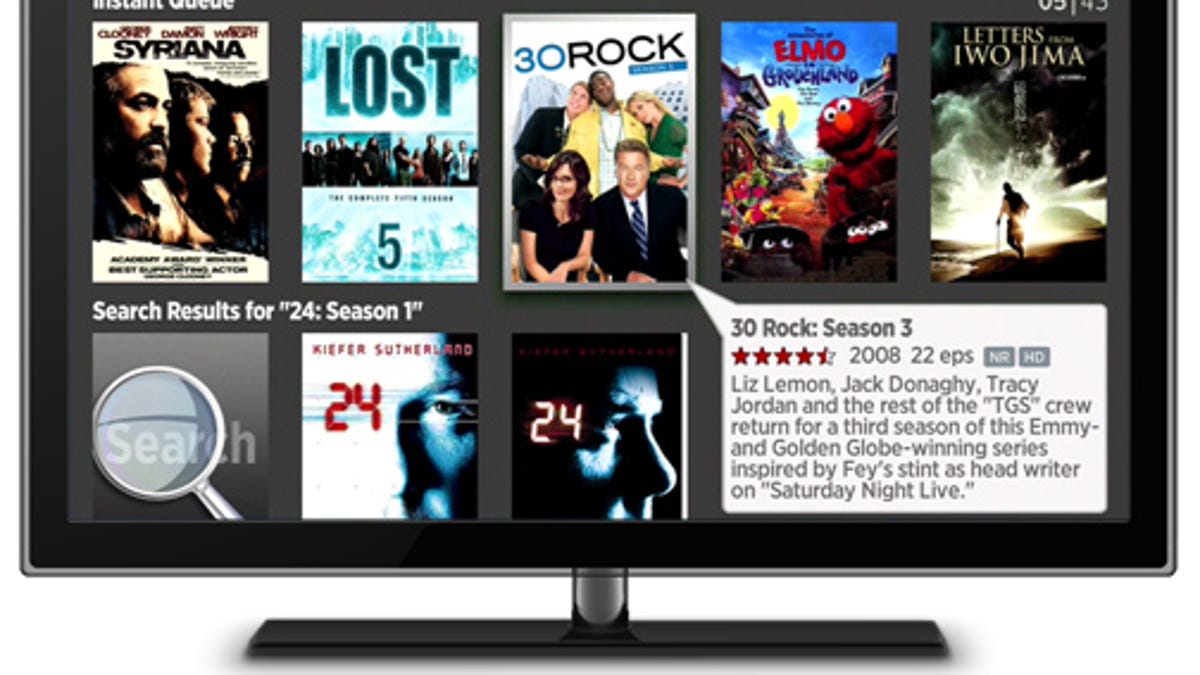Netflix Q1 likely strong, but beyond that, who knows?
Two analysts say today that Netflix will post a strong first-quarter earnings next week, but they have doubts about its success for the rest of the year.

When Netflix reveals its first-quarter earnings Monday, two analysts say, the results should be stronger than initially believed. Then comes the rest of the year, which isn't looking so hot.
Sterne Agee analyst Ray Young, who has been following the company's shares for quite some time, says that Netflix could post revenue of $865 million for the first quarter, landing towards the top of its $842 million to $877 million guidance. And although the analyst thinks Netflix will post a loss of 19 cents per share, it's far below the company's upper-level guidance of a loss of 49 cents.
Wedbush analyst Michael Pachter has a similar take on Netflix's first quarter, saying that he expects the company's revenue for the three-month period to top $874 million, with an earnings-per-share loss of less than 16 cents. Most importantly for Netflix, Pachter believes the company might have added even more subscribers than anticipated.
"In our view, heavy advertising spending in the second half of the quarter (which negatively impacted EPS) and the availability of Starz content for the majority of the quarter (through the end of February) likely resulted in domestic streaming subscriber net additions that exceeded expectations (Netflix guided to 22.8 - 23.6 million domestic streaming subs at the end of Q1, implying net additions of 1.13 - 1.93 million)," Pachter wrote in his note.
But that's about all of the good news the analysts could come up with on Netflix. As Pachter notes, Netflix lost a key content partner -- Starz -- at the end of February, thinning out its content library. That winnowing effect is unlikely to be adequately addressed anytime soon, Pachter says, putting pressure on Netflix to keep subscribers who might become disenfranchised by the lack of content coming back.
"The international rollout and the expiration of the Starz deal (resulting in a lower-quality catalog) create uncertainty over the sustainability of growth," Pachter wrote. "Investors appear focused solely on subs growth, which will likely require elevated advertising spending. We expect management to chase subscriber growth at all costs, driving marketing spending ever higher, making them unlikely to provide a specific earnings range for the full year."
On the financial side, Young is becoming increasingly concerned with Netflix's rising content costs, saying that they could "increase 38 percent in 2012 on top of a 55 percent increase in 2011." What's worse, Young says, Netflix's "revenue is expected to increase only 12 percent in 2012 versus 48 percent in 2011."
Netflix is by no means unaware of its troubles, and has continued to expand globally to increase its subscriber base and generate more revenue to fend off its skyrocketing content costs. Still, the company finds itself in a catch-22. Without content, subscribers won't want to pay for its service. However, streaming movies and television shows are becoming increasingly expensive as studios request more cash to offer up their libraries, and Netflix just doesn't have that cash to invest.
The company tried to address that issue last year by increasing prices on its hybrid plans that include both streaming and DVD rentals. After that was met with near-universal outcry, Netflix considered spinning off its rental operation before deciding it would be too costly. Since then, it has been floating rudderless as competitors, like Amazon and Hulu, circle.
Investors, meanwhile, have been responding to the decline with a rapid sell-off that has seen Netflix's shares shave off 56 percent of their value in the last year. The company's shares are currently trading at $105.95. Netflix's 52-week high is $304.79 per share.
Looking ahead, both Young and Pachter say it'll be difficult to chart Netflix's future success or failure because of the inability to determine how the company will respond to less content and subscriber attrition. Young went so far as to not provide a 12-month stock price target on Netflix because of the uncertainty surrounding the company. Pachter, however, didn't pull any punches. He believes that in the next 12 months, Netflix's shares will drop to $45, losing another 50 percent of their value in the next year alone.

